七年级英语下册第四单元第一课时的教案
初中英语人教版七年级下册第四单元第一课时教学设计
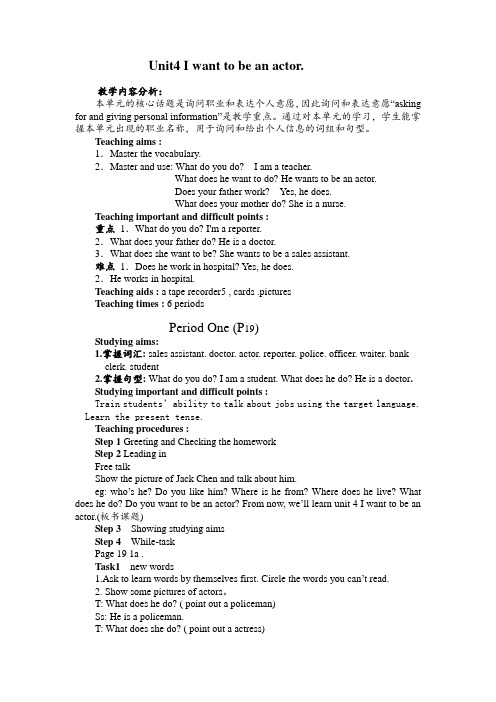
Unit4 I want to be an actor.教学内容分析:本单元的核心话题是询问职业和表达个人意愿,因此询问和表达意愿“asking for and giving personal information”是教学重点。
通过对本单元的学习,学生能掌握本单元出现的职业名称,用于询问和给出个人信息的词组和句型。
Teaching aims :1.Master the vocabulary.2.Master and use: What do you do? I am a teacher.What does he want to do? He wants to be an actor.Does your father work? Yes, he does.What does your mother do? She is a nurse.Teaching important and difficult points :重点1.What do you do? I'm a reporter.2.What does your father do? He is a doctor.3.What does she want to be? She wants to be a sales assistant.难点1.Does he work in hospital? Yes, he does.2.He works in hospital.Teaching aids : a tape recorder5 , cards .picturesTeaching times : 6 periodsPeriod One (P19)Studying aims:1.掌握词汇: sales assistant. doctor. actor. reporter. police. officer. waiter. bankclerk. student2.掌握句型: What do you do? I am a student. What does he do? He is a doctor.Studying important and difficult points :Train students’ability to talk about job s using the target language. Learn the present tense.Teaching procedures :Step 1 Greeting and Checking the homeworkStep 2 Leading inFree talkShow the picture of Jack Chen and talk about him.eg: who’s he? Do you like him? Where is he from? Where does he live? What does he do? Do you want to be an actor? From now, we’ll learn unit 4 I want to be an actor.(板书课题)Step 3Showing studying aimsStep 4While-taskPage 19 1a .Task1 new words1.Ask to learn words by themselves first. Circle the words you can’t read.2. Show some pictures of actors。
人教版新目标七年级英语下册 Unit 4 教案

人教版新目标七年级英语下册 Unit 4 教案一. 教材分析人教版新目标七年级英语下册Unit 4主要围绕日常生活话题,培养学生运用英语进行简单交流的能力。
本单元包括三个部分:听说课、读课和综合语言运用课。
听说课主要训练学生听懂并能够运用日常用语进行交流;读课通过阅读培养学生的阅读理解能力;综合语言运用课则通过各种活动,让学生在实际语境中运用所学知识。
二. 学情分析七年级的学生已经掌握了基本的英语语音、词汇和语法知识,具备一定的英语听说读写能力。
但部分学生在语言运用方面仍有困难,需要通过大量的练习来提高。
此外,学生对日常生活中的英语交流感兴趣,但可能在实际操作中感到羞涩和紧张。
三. 教学目标1.知识目标:学生能够听懂、会说、会读本单元的生词和重点句子,掌握日常交流的基本表达方式。
2.能力目标:学生能够在日常生活中运用所学知识进行简单交流,提高英语应用能力。
3.情感目标:激发学生对英语学习的兴趣,培养积极向上的学习态度。
四. 教学重难点1.重点:本单元的生词、短语和句子。
2.难点:日常交流中动词时态的运用。
五. 教学方法采用任务型教学法,通过各种互动活动,让学生在实际语境中运用所学知识。
同时,运用分组合作、同伴互助等方法,激发学生的学习兴趣,提高课堂参与度。
六. 教学准备1.教师准备:提前熟悉教材,设计教学活动,准备相关教学资源。
2.学生准备:预习本单元的生词和句子,了解日常交流的基本表达方式。
七. 教学过程1.导入(5分钟)利用图片或实物引导学生谈论日常生活中的人物和事物,激发学生的学习兴趣。
2.呈现(10分钟)教师展示本课的生词和句子,让学生听懂并跟读。
同时,通过情景剧等形式,展示日常交流的基本表达方式。
3.操练(10分钟)学生分组进行角色扮演,模拟日常生活中的场景,运用所学知识进行交流。
教师巡回指导,纠正发音和语法错误。
4.巩固(5分钟)教师设计一些练习题,让学生口头回答,巩固所学知识。
5.拓展(5分钟)学生分组讨论,尝试用英语编写一个小故事,运用本课所学词汇和句型。
新版-人教版七年级英语下册第四单元教案

新版-人教版七年级英语下册第四单元教案一、教学目标1.学生能掌握本单元的重点词汇和短语2.学生能听、说、读、写关于日常生活的简单对话3.学生能用所学语言描述简单的家庭活动和学校生活4.培养学生听、说、读、写英语的能力二、教学重难点1.重点:本单元的重点词汇和短语;日常生活的简单对话;家庭活动和学校生活的描述。
2.难点:如何把所学语言运用到实际生活中;如何降低英语学习的焦虑度。
三、教学内容和过程时间教学内容教学过程1分钟接活动教师问候学生,介绍本次教学内容5分钟课程导入用图片和视频展示日常生活中的物品和活动,引导学生进入本单元学习的情境10分钟单词和短语学习通过图片和音频教授本单元的重点词汇和短语15分钟对话学习听读对话,学习对话中的词汇和句子,培养学生听、说的能力10分钟语音练习教师示范语音练习,帮助学生纠正发音错误20分钟语法练习通过填空和对话,让学生复习本单元所学语法5分钟教师本节课的教学内容四、教学方法1.听、说、读、写相结合的教学方法2.合作学习的教学方法3.教师示范和学生参与的教学方法五、教学评价1.用评分表记录学生的听力、口语、阅读、写作能力2.通过课堂练习和作业评价学生的掌握程度3.通过学生的成绩单和家长反馈评价本次教学效果六、教学资源和评估方法1.教学资源:电子白板、投影、PPT、音频文件、教学评分表2.教学评估方法:课堂练习、作业、考试成绩、学生评价、家长反馈七、课堂延伸1.建议学生自己编写一些简单的日常对话,加深对本单元所学内容的理解和运用2.鼓励学生自学资源,如通过网站或应用程序练习语音和听力技能。
八、教学反思1.通过评估学生表现,教师可以了解到学生在哪些方面仍需加强练习和学习。
2.对课堂延伸给予具体的建议,扩展学生对英语学习的兴趣和深度。
七下英语第四单元Unit 4 section B 1a-1d教学设计
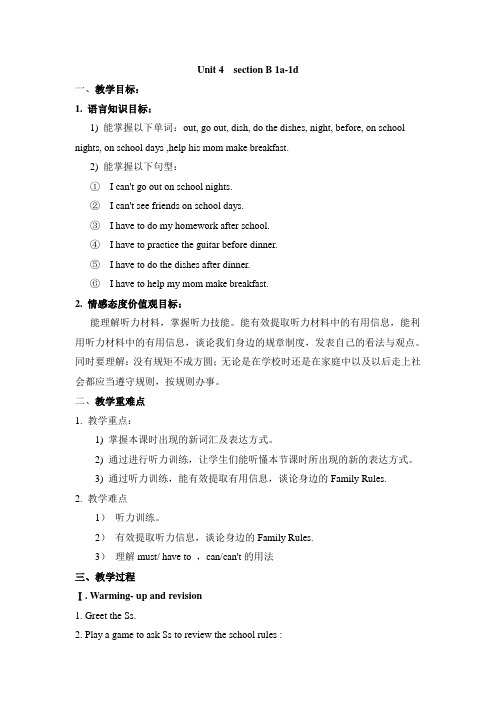
Unit 4 section B 1a-1d一、教学目标:1. 语言知识目标:1) 能掌握以下单词:out, go out, dish, do the dishes, night, before, on school nights, on school days ,help his mom make breakfast.2) 能掌握以下句型:①I can't go out on school nights.②I can't see friends on school days.③I have to do my homework after school.④I have to practice the guitar before dinner.⑤I have to do the dishes after dinner.⑥I have to help my mom make breakfast.2. 情感态度价值观目标:能理解听力材料,掌握听力技能。
能有效提取听力材料中的有用信息,能利用听力材料中的有用信息,谈论我们身边的规章制度,发表自己的看法与观点。
同时要理解:没有规矩不成方圆;无论是在学校时还是在家庭中以及以后走上社会都应当遵守规则,按规则办事。
二、教学重难点1. 教学重点:1) 掌握本课时出现的新词汇及表达方式。
2) 通过进行听力训练,让学生们能听懂本节课时所出现的新的表达方式。
3) 通过听力训练,能有效提取有用信息,谈论身边的Family Rules.2. 教学难点1)听力训练。
2)有效提取听力信息,谈论身边的Family Rules.3)理解must/ have to ,can/can't的用法三、教学过程Ⅰ. Warming- up and revision1. Greet the Ss.2. Play a game to ask Ss to review the school rules :1) Don’t fight with your classmates.Don’t listen to music in the classroomDon’t arrive late for class. Don’t run in the hallwaysDon’t eat in the classroom. You must eat in the dining hall.2) Now tell the Ss the importance of rules. As Ss, we must follow the school rules at school. And at home ,we must follow the family rules. Let some Ss say their home rules.S1: I have to do my homework first.T: A goog rule,homework is always the first.S2: I have to help my mom make breakfast every morning.T: You are good student,Great.S3: I must practice the guitar before dinner.T: Good, taking up a hobby is useful.S4: I must clean my room every Saturday.T: Good, keeping your room clean is good for your health.3) Now tell Ss :Rules are important for every one.Parents make so many rules to help us. We must follow them.If you follow the rules from now,and stick to them, you will be successful in the future.So we can say rules make you great.Now our friend Dave is here.There are so many rules in his house.Let’s talk about Dave’s family rules.Ⅱ. Presentation1. Show some pictures on the big screen and let Ss learn the new words andexpressions.2. Ask Ss to match the rules with the pictures.___ go out___ see friends___ do his homework___ practice the guitar___ do the dishes___ watch TV___ help his mom make breakfast___ clean his room3. Check the answers with the class.Then ask Ss to read and remember the rules for two minutes.4. Tell Ss some things Dave can't do, but some things Dave has to do.Now listen to the tape twice.Ⅲ. Listening1.Tell Ss they'll listen to the recording about Dave's house rules. Listen and put an×for things Dave can't do and a √for things he has to do.2. Play the recording for the Ss to listen and check.3. Play the recording again for the Ss to check the answers.IV listening1.Listen twice and complete the sentences.Dave can’t on school nights. He can’t see hisfriends . He has to do hishomework . He mustbefore dinner. He can’t watch TV . He has to help his mom make breakfast . He mustevery Saturday.2. Check the answers with the students.V. Listening1. Now let's work on 1c. Now first, let's read the phrases after teacher.2. Explain the meaning of the phrases if necessary.3. Play the recording twice for the Ss to listen and write the phrases in the chart in 1b.4. Check the answers:VI. Now let Ss talk about Dave’s family rules. Some things he can’t do,and some things he has to do.①He can’t go out.②He can’t in the evening.③He can’t see his friends⑤He has to after school⑥He has to help his mom every morning⑦He must before dinner.⑧He must clean his roomVII. Make a conversation with your partnerA: Hi, _____. Do you want to ________.B: ... I can’t _____________.A: Oh, that’s too bad.B: Yeah, I have so many rules…A: Really?B: Yeah, I can’t _____________________.A: What other rules do you have?B: Mmm…I must ________________.A: Oh. Well, I have to _____________.B: Me, too. I have to _______________.A: Wow, you do have a lot of rules!Ⅷ ReportingReport your friend’s family rules. See who is the best? Like this:My best friend is xxx. He has so many family rules.Ⅸ.SummaryGood Rules, Good Situations.Good Rules, Good Families.Good Rules, Good Schools.Good Rules, Good SocietyRules are useful. Rules are helpful. If everyone follow the rules very, we will live in a good society.X. Homework.Write your friend a report about your own family rules .There are too many ruels in my family. I have toThat’s all. Thank you!。
人教版7年级下英语第四单元教案
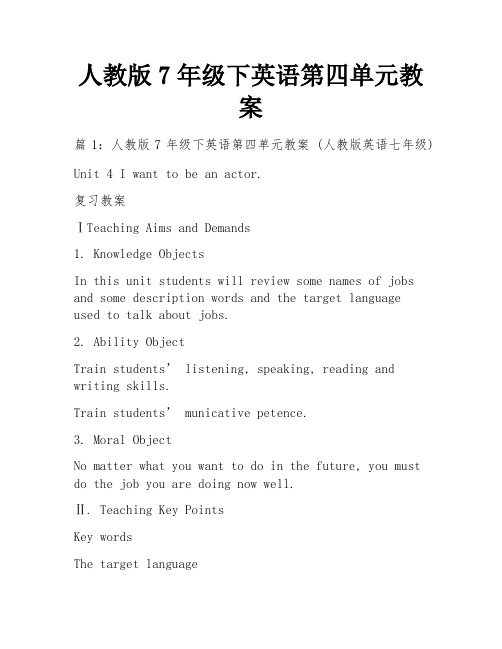
人教版7年级下英语第四单元教案篇1:人教版7年级下英语第四单元教案 (人教版英语七年级) Unit 4 I want to be an actor.复习教案ⅠTeaching Aims and Demands1. Knowledge ObjectsIn this unit students will review some names of jobs and some description words and the target language used to talk about jobs.2. Ability ObjectTrain students’ listening, speaking, reading and writing skills.Train students’ municative petence.3. Moral ObjectNo matter what you want to do in the future, you must do the job you are doing now well.Ⅱ. Teaching Key PointsKey wordsThe target languageReview how to talk about and describe jobs.Review the present tense.Review What and Where questions.Ⅲ. Teaching DifficultiesTrain students’ listening, speaking, reading and writing skills..Review how to read and write a newspaper want ad.Review how to write a letter applying for a job.Ⅳ. Teaching MethodsPairworkPracticing methodsⅤ. Teaching AidsA puterCardsⅥ. Teaching ProceduresStepⅠ ad1. In this activity you’re to write your own newspaper want ad.First you should decide what kind of job you can offer to people.Then consider what you are going to write about.2. Set a time limit of two or three minutes for students to prepare before writing the ad.3. Have students start to write their own newspaper want ads.4. Ask a student to write his or her ad on the blackboard. Correct any language and spelling errors along with the rest students.StepⅡ Pair work-talk about jobsUse these target language to make a conversation with your partner.What does he do?He’s a waiter.What do you want to be?I want to be an actor.Where does she work?She works in a bank.What does he do?He’s a student. He wants to be a doctor.StepⅢ Review the structures1. Review the where and what questions. Write sentences on your exercise book. Write as many as you can.2. Ask several students to read their sentences.StepⅣ Review the key vocabulary1. Give students several minutes to memorize the key vocabulary.Doctor, actor, reporter, police officer, waiter, band, clerk, sales assistant, student, dangerous, fun, exciting, difficult, boring, interesting2. Have a dictation.StepⅤ SummaryIn this class we’ve reviewed all the key words inthis unit .We also reviewed to write a newspaper want ad.StepⅥ HomeworkReview all the key words and language points learned in this unit.Blackboard DesignUnit 4 I want to be an actor.What does he do?He’s a waiter.What do you want to be?I want to be an actor.Where does she work?She works in a bank.教学反思:篇2:人教版七年级上英语第四单元复习资料be动词的种类:be动词包括“am”, “is”, “are”三种形式。
【精细】人教版七年级下册英语Unit4第四单元备课教案

【精细】人教版七年级下册英语Unit4第四单元备课教案精细人教版七年级下册英语Unit4第四单元备课教案教学目标- 通过本课教学,使学生学会描述自己的笔友并分享对方的喜好和爱好。
- 培养学生的听、说、读、写能力,提高他们的英语综合运用能力。
- 引导学生形成团队合作的精神。
教学重难点- 教学重点:研究如何描述自己的笔友的外貌特征、爱好和喜欢的事物。
- 教学难点:如何运用所学的语言知识描述自己的笔友。
教学准备- 教材:人教版七年级英语下册- 多媒体设备:投影仪、电脑教学过程导入(5分钟)在黑板上写下一个问题:“Do you have a pen pal?”,并引导学生思考和回答。
鼓励学生积极参与讨论。
呈现(10分钟)通过多媒体设备呈现关于笔友的图片和信息,引导学生观察图片,了解笔友的外貌和喜好。
帮助学生理解并记住关键词汇。
对话练(15分钟)将学生分成小组,让他们互相描述各自的笔友。
每个学生都有机会向小组成员介绍他们的笔友并分享对方的喜好和爱好。
教师在此过程中积极引导和纠正学生的语言使用。
听力训练(15分钟)播放与单元主题相关的听力材料,要求学生根据听到的内容在练册上填空。
教师可以随机抽问学生并进行评价。
练与拓展(20分钟)1. 学生自己撰写一篇关于自己的笔友的短文,并向同组成员分享。
2. 邀请几个学生上台展示他们的短文,并给予评价和鼓励。
总结与布置作业(5分钟)对本节课的内容进行简要总结,并布置作业:要求学生写一封书信给自己的笔友,介绍自己的研究情况和最喜欢的活动。
教学延伸- 鼓励学生在课后与自己的笔友进行邮件交流,加深彼此的了解。
- 提供额外阅读材料,让学生阅读关于笔友的故事,并进行相关练。
- 引导学生自己设计和制作一份关于笔友的海报或简介。
人教版英语七年级下册Unit4 Don't eat in class全单元教案
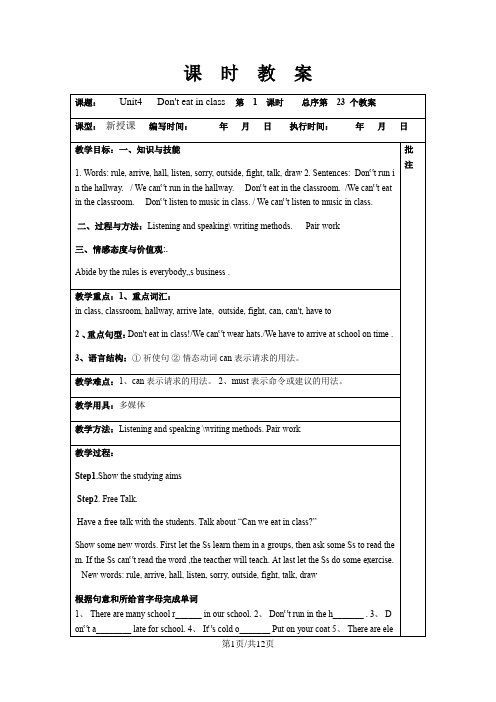
T||ask 2Show Ss some pictures,||then let Ss talk about them with “W||e can‟t…../Don‟t……/We can……?” S1: W||e can‟t arrive late for class. /Don‟t ar||rive late for class. S2: We ca||n‟t run in the hallways. /Don‟t run in||the hallways.
3、语言结构:
①情态动词must与have to的用法②情态动词ca||n表示许可的用法
教学难点:1、用英语制定有关规定
2、情态动词must与have t||o的用法
教学用具:多媒体
教学方法:Li||stening and speaking \writing methods.||Pair work
教学过程:
教学用具:多媒体
教学方法:Listening and spea||king \writing methods. Pa||ir work
教学过程:
Step1.Show the studying aims
Step2. Free Talk.
Have a free talk wi||th the students. Talk||about “Can we eat in class?”
Task 1通过师生问答的方式复习祈使句||,引出情态动词,呈现本课的教学难点。T: L||et‟s say the school rul||es using can ,can‟t, mus||t, have to . S1: We can‟t||arrive late for class. /Don‟t arri||ve late for class. S2: We can‟t r||un in the hallways. /Don‟||t run in the hallways.Task 2||操练句型直至学生熟练的掌握Step5.Consolad||ation.
2021-2022学年人教版七年级下册英语Unit 4 教案

4.Check the answers.
Students listen to the tape carefully.
Students listen and write the numbers after the names.
Teaching aims
Knowledge objects:
enable the students to master new words
Imperatives Don’t and the usage of can
Ability objects:
Students can use imperatives Don’t to describe the rules.
2.Help students answer. For example:Don’t eat in class.Don’t listen to music in class,etc.
ck the answers.
1.Learn and read the sentences in 1a.
2.Write the number of the rules next to the student.
Language structures: imperative sentences and modal verbs can, have to,must
Teaching difficulty
use target sentences to describe rules in school and in family
complete the dialogue according to thepicture.
人教版英语七年级下册Unit4SectionA(1a1c)教学设计
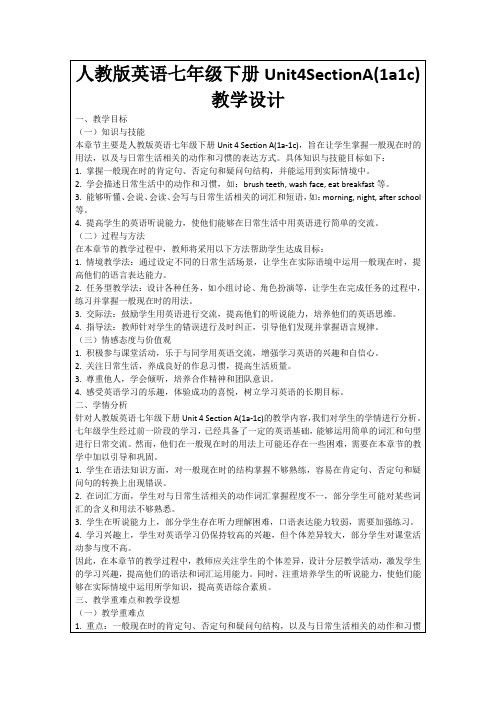
1.学生在语法知识方面,对一般现在时的结构掌握不够熟练,容易在肯定句、否定句和疑问句的转换上出现错误。
2.在词汇方面,学生对与日常生活相关的动作词汇掌握程度不一,部分学生可能对某些词汇的含义和用法不够熟悉。
3.学生在听说能力上,部分学生存在听力理解困难,口语表达能力较弱,需要加强练习。
4.学习兴趣上,学生对英语学习仍保持较高的兴趣,但个体差异较大,部分学生对课堂活动参与度不高。
人教版英语七年级下册Unit4SectionA(1a1c)教学设计
一、教学目标
(一)知识与技能
本章节主要是人教版英语七年级下册Unit 4 Section A(1a-1c),旨在让学生掌握一般现在时的用法,以及与日常生活相关的动作和习惯的表达方式。具体知识与技能目标如下:
1.掌握一般现在时的肯定句、否定句和疑问句结构,并能运用到实际情境中。
(三)学生小组讨论
1.教师将学生分成若干小组,每组选择一个话题,如:早晨、中午、晚上或周末的日常活动。
2.各小组用一般现在时讨论话题,每位同学都要参与讨论,记录下组员的日常习惯。
3.讨论结束后,各小组派一名代表汇报讨论成果,其他同学认真倾听,互相学习。
(四)课堂练习
1.教师发放练习题,包括一般现在时的肯定句、否定句和疑问句转换,以及与日常生活相关的动作词汇填空。
2.学会描述日常生活中的动作和习惯,如:brush teeth, wash face, eat breakfast等。
3.能够听懂、会说、会读、会写与日常生活相关的词汇和短语,如:morning, night, after school等。
4.提高学生的英语听说能力,使他们能够在日常生活中用英语进行简单的交流。
Unit 4教案2021-2022学年人教版英语七年级下册
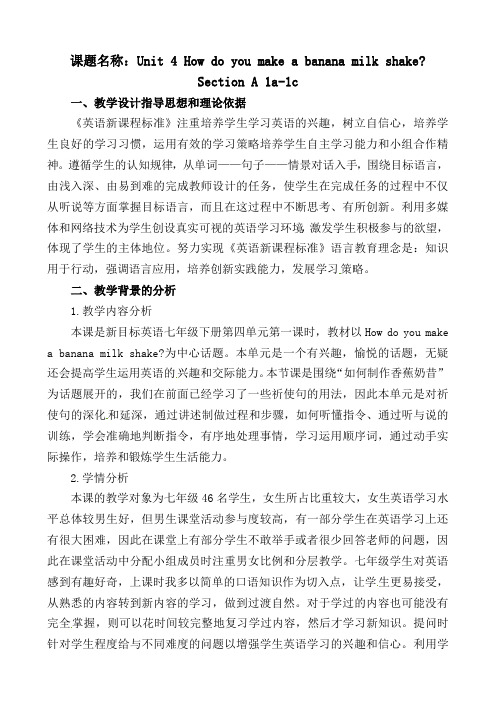
课题名称:Unit 4 How do you make a banana milk shake?Section A 1a-1c一、教学设计指导思想和理论依据《英语新课程标准》注重培养学生学习英语的兴趣,树立自信心,培养学生良好的学习习惯,运用有效的学习策略培养学生自主学习能力和小组合作精神。
遵循学生的认知规律,从单词——句子——情景对话入手,围绕目标语言,由浅入深、由易到难的完成教师设计的任务,使学生在完成任务的过程中不仅从听说等方面掌握目标语言,而且在这过程中不断思考、有所创新。
利用多媒体和网络技术为学生创设真实可视的英语学习环境,激发学生积极参与的欲望,体现了学生的主体地位。
努力实现《英语新课程标准》语言教育理念是:知识用于行动,强调语言应用,培养创新实践能力,发展学习策略。
二、教学背景的分析1.教学内容分析本课是新目标英语七年级下册第四单元第一课时,教材以How do you make a banana milk shake?为中心话题。
本单元是一个有兴趣,愉悦的话题,无疑还会提高学生运用英语的兴趣和交际能力。
本节课是围绕“如何制作香蕉奶昔”为话题展开的,我们在前面已经学习了一些祈使句的用法,因此本单元是对祈使句的深化和延深,通过讲述制做过程和步骤,如何听懂指令、通过听与说的训练,学会准确地判断指令,有序地处理事情,学习运用顺序词,通过动手实际操作,培养和锻炼学生生活能力。
2.学情分析本课的教学对象为七年级46名学生,女生所占比重较大,女生英语学习水平总体较男生好,但男生课堂活动参与度较高,有一部分学生在英语学习上还有很大困难,因此在课堂上有部分学生不敢举手或者很少回答老师的问题,因此在课堂活动中分配小组成员时注重男女比例和分层教学。
七年级学生对英语感到有趣好奇,上课时我多以简单的口语知识作为切入点,让学生更易接受,从熟悉的内容转到新内容的学习,做到过渡自然。
对于学过的内容也可能没有完全掌握,则可以花时间较完整地复习学过内容,然后才学习新知识。
(word完整版)人教版七年级英语下册第四单元教案

UNIT 4Don ’teat in class.Section A第1课时(1a~1c)自主学习方案1.自学生词,并记着拼读及拼写。
2.预习课本找出要点短语及句子。
(见教案自学导练内容)3.读记后达成自学导练内容。
讲堂导学方案Step 1 情形导入Show the students the picture of fighting.T:Look at the two boys. What are they doing?Ss:(Help Ss) :They are fighting.T : Can we fight?Ss:No,we can't.T : What should we say to the boys?Ss:We should say to them: Don't fight.环节说明:经过师生对话引出新知识—祈使句。
Step 2 达成教材 1a_1c 的任务1.学习 la 中的学校规定,高声朗诵这些规定,而后将这些规定的序号填在相对应的人物旁边。
(3 分钟)2.认真听录音,找出Peter, Amy 和 Mike 违犯了哪些规定,在lb 中的横线上写出la中的数字,师生共同查对答案。
(2 分钟)3.再听一遍录音,同时跟读。
(2 分钟)4.练习 lc 中的对话。
而后编写新对话,小组内进行对话练习,并进行组与组之间的比赛,教师评论。
(5 分钟)5.小结训练。
(3 分钟)把以下祈使句改成否认形式。
(1)Eat in the hall.(2)Talk loudly.Don't eat in the hall. Don't talk loudly.环节说明:听闻联合,第一时间向学生传达语言目标,经过结对对话练习和小结训练,学生能够娴熟掌握祈使句。
Step3 问题研究1.arrive 的用法用arrive,arrive in/at 填空。
(1)When do you arrive in Shanghai every week?(2)When I arrive at Yucai Middle School in Shanghai,it is 7:50.(3)After I arrive here, I begin my class.【注意】 arrive“抵达”,arrive 是一个不及物动词,不可以直接跟表示地址的名词。
七年级英语下册第四单元第一课时教案

单元题目Unit 4 Don’t eat in class.第1课时Section A Period 1 (1a—2d)Teaching Goals1. Master the new words :rules, arrive, late, hall, dinning hall, listen, listen to, fight, sorry2. Learn to talk about the rules by using the following sentences①Don't eat in class.②You must be on time.③Eat in the dining hall.3.Learn the meanings of signs,express and make some rules in English.Teaching Importance and Difficulties:Modle verbs have to and must.Teaching Procedures:Ⅰ. Warming-up and revisionAsk stuents to do the following:Please stand up/ sit down.Close the door, please.Look at me and listen to me.Don’t open your books.Don’t talk.Let’s begin our class.Grammar1.祈使句是表示请求、命令、建议、叮嘱、号召、劝告等的句子; 通常省略主语you,以动词原形开头,句尾一般用降调。
2.祈使句有肯定和否定两种:例如:Be quiet! 安静!Come in, please! 请进!Sit down, please. 请坐。
否定的祈使句是在动词原形前加Don't.e.g. Don't talk in class! 不要在课常上讲话!Don't open the window! 别开窗!Don’t arrive late for school. 上学别迟到!Don’t smoke! 别吸烟!Ⅱ. PresentationShow pictures to students and ask questions:Pionting to the boy in the picture ,ask questions:T:What’s the boy doing? S: He’s running.T: Where is he running? S: He’s running in the hallways.T:Can you run in the hallways? S: No, I can’t.T: So please don’t run in the hallways.(= You can’t run in the hallways.)T:Why is he running in the hallways? S: He’s late.T: Oh, he’s late for class.You can’t arrive late for class.= Don’t arrive late f or class.…Ⅲ. 1aT: Now, Look at the picture on your textbook. Each of the students is breaking one of these rules.Please finish 1a. Ask students to finish 1a,check the answers ,then read them. SCHOOL RULES1. Don’t arrive late for class. You must be on time.2. Don’t run in the hallways.3. Don’t eat in the classroom. You must eat in the dining hall.4. Don’t listen to music in the classrooms or the hallways.5. Don’t fight.Ⅳ. Listening1. T: Now let’s listen! What rules are these students breaking? Write the numbers after names?2. 学生们听录音,完成1b,选出四位学生都违反了哪条校规;听之前,学生要读会英文名。
人教版英语七年级下册教案unit4 don't eat in class

3. Careful reading
1) Read Dr. Know's letter and answer the question:
What does she think of the school and home rules?
句型:①Don't eat in class.
②You must be on time.
③Eat in the dining hall.
课后反思
Unit 4 Don't eat in class
课题
Unit4
课型
新
教学目标
1.重点单词:outside,wear,important,bring,uniform,quiet
A.don't B.can't C.aren't D.are
(C)3.You ________ go in a hurry(匆忙).There's enough time left.
A.have to B.hadn't
C.don'thave to D.haven't to
作业布置
请同学们做前面课时训练部分。
2) Ss read Dr Know's letter and find the answer to the question.
3) Let one student read out his/her answer.
(She thinks parents and schools are sometimes strict, but they make rules to help us. We have to follow them. )
人教版七年级英语下册教案Unit 4 教案

人教版七年级英语下册教案Unit 4 教案In Unit 4.we learn about rules and ns。
especially the ones we should follow in class。
In this n。
we will focus on using XXXFirst。
we will learn some new words。
such as "rules," "arrive," "late," "hall," "dining hall," "listen," "XXX," "fight," and "sorry." We will also learn some new sentence structures。
such as "Don't eat in class," "You must be on time," and "Eat in the dining hall."We will also learn about the meanings of some signs and symbols。
In terms of nal and moral values。
we will understand the importance of rules and ns in our daily lives。
both at school and at home。
and in society in general。
XXX will be on the use of imperative sentences。
including affirmative and negative forms。
七年级下册英语教案(第四单元)
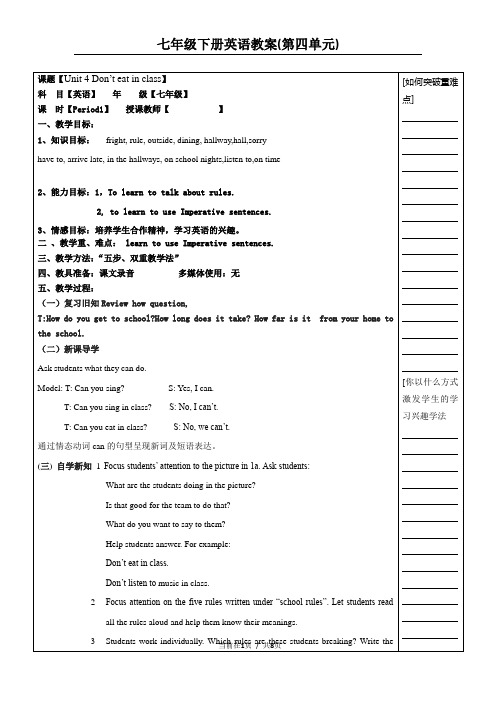
A: What club do you want to join? B: I want tojoin the English club.
A: What club do you want to join? B: I want tojoin the music club.
(九)教学反思
[如何突破重难点]
[你以什么方式激发学生的学习兴趣学法
【教师精心设计典例分析】
备注:
课题【Unit 1 Can you play the guitar?】
科 目【英语】 年 级【七年级】
课 时【Period2】 授课教师【 】
一、教学目标:
1、知识目标:be good at, tell , story ,English club,art club ,music club, chess club
A: Can youplaychess?B: No, I can’t.
2)be good at sth / doing sth.
3)tell stories
(九)教学反思
[如何突破重难点]
[你以什么方式激发学生的学习兴趣学法
【教师精心设计典例分析】
备注:
课题【Unit 4 Don’t eat in class】
(二)新课导学
Ask students what they can do.
Model: T: Can you sing?S: Yes, I can.
T: Can you sing in class?S: No, I can’t.
T: Can you eat in class?S: No, we can’t.
Unit4第1课时(SectionA1a-2c)(教学设计)七年级英语下册(人教版)
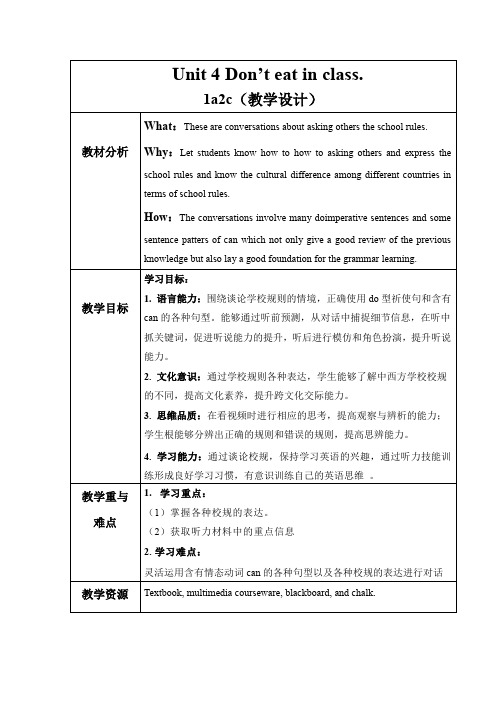
学生在看图片和思考区别时,是否表现积极主动,是否能正确的;学生是否能准确无误的完成练习。
Whilelistening (15’)
Step 5
T plays the recording in 2a for the first time to ask Ss to finish 2a.
T plays the recording for the second time to ask Ss to plete 2b. After that. T invites some Ss to show their answers.
After that, T asks Ss to think about the question:“What school rules do you know?”
Ss guess a Chinese saying and think about the question:“What school rules do you know?”
Step 2
T asks Ss to watch a video and then answer the question“What rules are talked about in this video”.
Ss watch a video and then answer the question
Homework (2’)
Level B:
1. Master what you have learned in this lesson.
2. Preview the conversation in 2d
Level A:
1. Finish the extra exercise in your workbook.
初中英语人教版七年级下册unit 4 第一课时教学设计
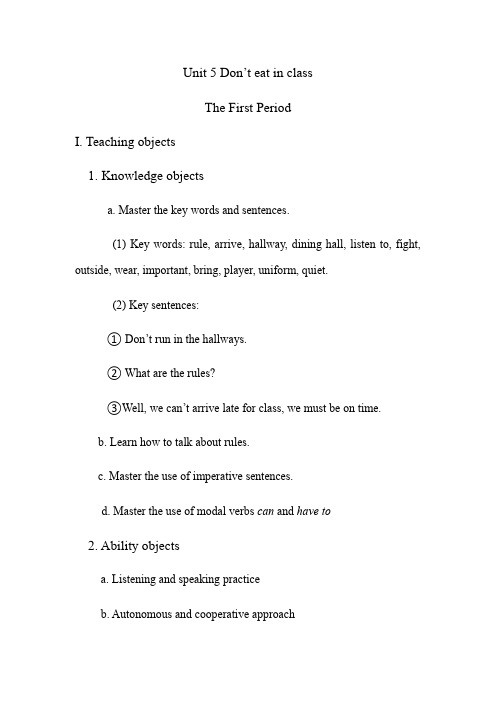
Unit 5 Don’t eat in classThe First PeriodI. Teaching objects1. Knowledge objectsa. Master the key words and sentences.(1) Key words: rule, arrive, hallway, dining hall, listen to, fight, outside, wear, important, bring, player, uniform, quiet.(2) Key sentences:① Don’t run in the hallways.② What are the rules?③Well, we can’t arrive late for class, we must be on time.b. Learn how to talk about rules.c. Master the use of imperative sentences.d. Master the use of modal verbs can and have to2. Ability objectsa. Listening and speaking practiceb. Autonomous and cooperative approach3. Emotional objectsGet to know the importance of obeying the rules. II. Teaching important pointsa. Master the key words and sentences.b. Learn how to talk about rules.c. Master the use of imperative sentences.d. Master the use of modal verbs can and have to. III. Teaching difficult pointsa. Master the use of imperative sentences.b. Master the use of modal verbs can and have to. IV. Teaching aidsA tape recorder, a projector, handouts.V. Teaching proceduresStep 1 Warm up1.Greeting2.Revision(1). Check the homework(2). Have a dictation of the words in the last unitStep 2 Presentation1. Lead inLet students enjoy a video about traffic rules2.Teach activity 1aT: Let’s look at the picture on page 19. Look at the students. What are they doing?Lead students to talk about what the children are doing.T: It is impolite to fight. So please don’t fight. We should be good friends. These are all class rules. What else can’t we do in our classroom? Please say the sentence like this: Don’t……Don't eat in the classroom.Don’t talk in class.Don’t listen to musicT: If you want to be good students, don’t break school rules. The rules are good for your study. But now in the picture some students are breaking these rules. Please write the number of the rules next to the student. Finally, check the answers.3. Teach activity 1bT: Now we will hear a conversation. It’s about three students. Please listen carefully and find out what rules they are breaking and write the numbers after the names.Play the recording the first time. Students only listen.Play the recording a second time. Students fill in the number of the rules after each name.Finally check the answers.Step 3 PracticeLet students read the conversation in 1c and make their own conversations. Then invite some pairs to act out.Step 4 ListeningActivities 2a & 2bNow let’s listen to the tape and check the activities Alan and Cindy are talking about. You need to do it individually, then we’ll check the answers.After finishing doing activity 2a, say: Can Alan and Cindy do these activities? Listen to the recording again, circle can or can’t above.Play the tape again for students to finish activity 2b. Then check theanswers.2.Pair work 2cLead students to read the example conversation in the speech bubbles so that they can know how to do these activities.Put students into pairs, ask them to make conversations like the modal using the rules in 1a. Finally invite several pairs to act out for the whole class.Step 5 SummaryIn this period, we’ve learnt how to talk about some rules at school. First we learnt some rules by matching them with the correct pictures. Through learning the rules, we mastered the use of imperative sentences and the modal verbs can and have to. Then we did some listening practice to consolidate the target language. Finally, we practiced using the imperative sentences and the modal verbs to talk about the rules by making a role-playing.Step 6 Homework1. Revise the rules2. Write some rules in your class.3. Finish the exercises in the workbook.4. Preview the next period.VI. Blackboard designVII. Teaching reflection本课时以规章制度为话题进行教学,和学生的学校生活息息相关,能够激发学生的学习兴趣。
七级英语下册第四单元第一课时的教案
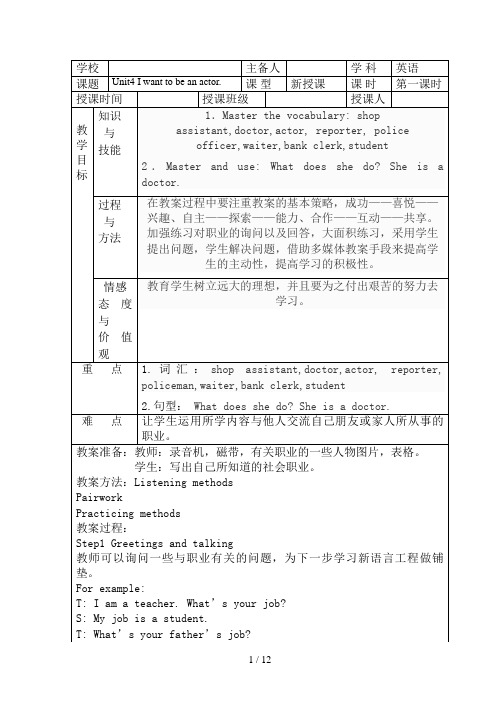
B。She’s a doctor.
Step7 Summary
Step8 Homework
1.让学生了解一些社会职业的特点,工作地点,并用简单的语言概括这些职业。
2.让学生预习下节课所学语言工程。
3.利用本课所学语言工程写一篇关于家庭成员所从事职业及工作地点的英语作文。
Ask more students to practice like this.
Step3 present the new words
教师向学生呈现一组有关职业的人物图片,让学生通过图片来学习有关职业的新单词及该职业有关的地点名词。
For example:
T: What does the man do?
Step8 Homework
复习本单元所学语言工程。
板书设计
Unit4 I want to be an actor.
(Section A1a-1c)
New words: shop,shop assistant,doctor, policeman,waiter,bank clerk,hospital,now,star
教案反思
学校
五棵树中学
主备人
苗爽
学科
英语
课题
Unit4 I want to be an actor.
课型
新授课
课时
第四课时
B: He is fromHong Kong,China.
A: What does he do?
B: He is an doctor.
Step2 Present the new words
通过图片来呈现新单词。教师向学生呈现一组有女警察,赵本山和护士的图片,教师和学生通过谈论图片来学习本课时的新语言工程。
- 1、下载文档前请自行甄别文档内容的完整性,平台不提供额外的编辑、内容补充、找答案等附加服务。
- 2、"仅部分预览"的文档,不可在线预览部分如存在完整性等问题,可反馈申请退款(可完整预览的文档不适用该条件!)。
- 3、如文档侵犯您的权益,请联系客服反馈,我们会尽快为您处理(人工客服工作时间:9:00-18:30)。
教学反思
学校
五棵树中学
主备人
苗爽
学科
英语
课题
Unit4 I want to be an actor.
课型
新授课
课时
第三课时
授课时间
授课班级
授课人
教
学
目标
知识
与
技能
1.Master the word newspaper
B: He is fromHong Kong,China.
A: What does he do?
B: He is an doctor.
Step2 Present the new words
通过图片来呈现新单词。教师向学生呈现一组有女警察,赵本山和护士的图片,教师和学生通过谈论图片来学习本课时的新语言项目。
情感
态度与
价值观
职业不分贵贱,懂得社会分工不同。
重点
1.词汇:policewoman, nurse, money, thief, late, out, TV station, police station
2,句型:What does Ann’s mother do ? She is a bank clerk,
Step6 Task
1.让学生分角色表演1c的对话。
2.让学生根据图片所提供的信息与同伴编对话。教师向学生呈现一组人物图片,然后让学生询问图片中人物所从事的职业。进一步巩固所学新语言项目what does sb. do?
Step7 Summary
回顾本课所学内容进行总结。本课主要学习了一些与职业有关的词汇和询问他人职业的句型。
听2a的录音找出答案并完成表格。
1.教师让学生听2a的录音,让学生回答Betty,Jenny,Sam想从事什么工作,并填入表格。
2.教师让学生再听一遍让回答为什么Betty,Jenny,Sam想从事这些工作,把原因填入表格。
3.让学生分角色表演2a的对话。
Step5 Pairwork
教师让学生与同伴利用本单元所学语言项目谈论自己喜欢的职业并编一个对话进行表演。
板书 actor.
(Section A2a-4)
New words: policewoman, nurse, money, thief, late, out, TV station, police station
Sentences: -What does Ann’s mother do? -She is a bank clerk.
S1: I want to be…
T: What does he want to be?
S2: He wants to be a…
(教师多向学生问相同的问题,并板书新句型。)
Step4 Task
1.听2a录音,让学生在1a中标出三组对话所对应的图画。
2.让学生再听2a,2b录音,完成2b表格。
3.让学生根据2a的图画进行问答练习。
Sentences: - What does she do?
- She is a doctor.
教学反思
学校
五棵树中学
主备人
苗爽
学科
英语
课题
Unit4 I want to be an actor.
课型
新授课
课时
第二课时
授课时间
授课班级
授课人
教
学
目标
知识
与
技能
1.Masterthe vocabulary: bank clerk. police officer. waiter. reporter. nurse. hospital. restaurant. TV station. Police Station.
情感
态度与
价值观
关注社会,关注人际关系,学会独立思考问题
重点
1.词汇newspaper
2.句型What does your father do? He is a policeman.
Does he want to be a policeman?
难点
让学生运用所学内容谈论不同的职业及其职业的特点。
教学准备:教师:录音机,磁带和图片。
通过师生问答呈现新句型what does sb. do?
For example:
T: I am a teacher. What do you do?
S: I am a student.
T: What does he do?
S; He is a worker.(point at a picture of a worker.)
教学反思
学校
五棵树中学
主备人
苗爽
学科
英语
课题
Unit4 I want to be an actor.
课型
Step3 Present the new drills
通过师生问答来呈现新句型What does/do…want to be?教师可以先给学生做个示范。
For example:
T: Now I am a teacher. I want to be a doctor. What do you want to be?
情感
态度与
价值观
教育学生树立远大的理想,并且要为之付出艰苦的努力去学习。
重点
1.词汇:shop assistant,doctor,actor,reporter,policeman,waiter,bank clerk,student
2.句型:What doesshe do?She is a doctor.
Step5 Present the drills
通过师生问答形式学习新语言项目Where does/do..work?
Step6 Task
1.让学生把3a的工作与图画中的任务对应起来。
2.让学生把3a中得工作和地点练习3b的对话。
A: Where does your sister work?
B; She works in a hospital.
What does Ann’s mother want to be? She wants to be a policewoman.
难点
让学生运用所学内容与他人交流自己朋友或家人所从事的职业及他们想从事的职业。
教学准备:教师:录音磁带,女警察,护士,服务员,成龙和赵本山的图片。学生:准备一张调查表。
教学方法:Cooperation, the Communicative Approach
A: What does she do?
B; She’s a doctor.
Step7 Summary
Step8 Homework
1.让学生了解一些社会职业的特点,工作地点,并用简单的语言概括这些职业。
2.让学生预习下节课所学语言项目。
3.利用本课所学语言项目写一篇关于家庭成员所从事职业及工作地点的英语作文。
教学过程:
Step1 Greetings and talking
教师利用多媒体或照片向学生呈现一幅名人图片。然后让学生根据图片信息进行自由交流,目的是训练学生的口语交际能力。
For example:
A: who is he?
B: He is Cheng Long.
A: Where is he from?
学生:准备调查用得表格。
教学方法:Listening, reading, writing and speaking methods.
Pairwork
Practicing methods
Groupwork
教学过程:
Step1 Greetings and talking
通过游戏进行自由交际。教师向学生出示一些有关职业的图片,然后让学生一个接一个地用英语说出图片中的人物所从事的职业,看谁说的对而快。
难点
让学生运用所学内容与他人交流自己朋友或家人所从事的职业。
教学准备:教师:录音机,磁带,有关职业的一些人物图片,表格。
学生:写出自己所知道的社会职业。
教学方法:Listening methods
Pairwork
Practicing methods
教学过程:
Step1 Greetings and talking
(Section B1a-2c)
New words: newspaper
Sentences: - What does your father do?
-He is a policeman.
-Does he want to be a policeman?
-Yes, he does./No,he doesn’t
教师可以询问一些与职业有关的问题,为下一步学习新语言项目做铺垫。
For example:
T: I am a teacher. What’s your job?
S: My job is a student.
T: What’s your father’s job?
S; His job is…
Step2 present the new drills
Step8 Homework
复习本单元所学语言项目。
板书设计
Unit4 I want to be an actor.
(Section A1a-1c)
New words: shop,shop assistant,doctor, policeman,waiter,bank clerk,hospital,now,star
2.Master and use: What doesshe do?She is a doctor.
